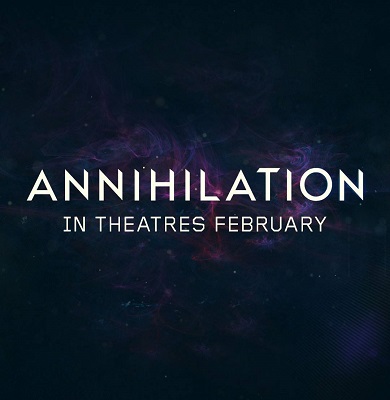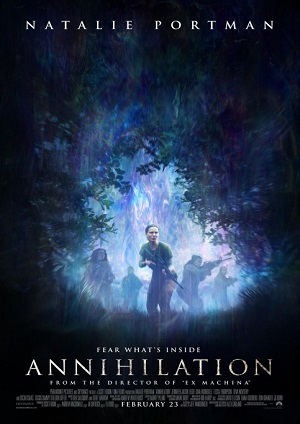Annihilation
A year after the disappearance and presumed death of her husband Kane (Oscar Isaac), Lena (Natalie Portman)

Whatever it is that’s hiding behind that curtain, I think it’s best it stays behind that curtain.
 Cast of Characters:
Cast of Characters:
Lena – Natalie Portman
Dr. Ventress – Jennifer Jason Leigh
Anya Thorensen – Gina Rodriguez
Josie Radek – Tessa Thompson
Cass Sheppard – Tuva Novotny
Kane – Oscar Isaac
Director – Alex Garland
Screenplay – Alex Garland
Based on the novel Annihilation by Jeff VanderMeer
Producer – Scott Rudin, Andrew Macdonald, Allon Reich & Eli Bush
Rated R for violence, bloody images, language and some sexuality
A year after the disappearance and presumed death of her husband Kane (Oscar Isaac), Lena (Natalie Portman), a professor of cellular biology at Johns Hopkins University, is stunned when he returns home without warning. She’s initially overcome with emotion by his return, yet she soon begins to realize that something’s not right with him. He remembers nothing about his mission; in fact, he doesn’t remember how he just got home. He’s emotionless and his responses are both mumbled and incoherent. The situation escalates when he becomes extremely ill, and as he’s being rushed to the hospital, both he and Lena are taken into custody to a research compound by a government security force.
Enter the compound’s psychologist Dr. Ventress (Jennifer Jason Leigh), who informs Lena of the nearby region of land that is enveloped by an aberrant, iridescent and ever-expanding curtain she has dubbed “The Shimmer”. Many research teams, one of which included Kane, have ventured into the Shimmer; only Kane has returned from it alive… barely.
Hoping to find a cure for her now comatose husband, Lena joins a new, highly-educated team of researchers which include Dr. Ventress, paramedic Anya Thorensen (Gina Rodriguez), physicist Josie Radek (Tessa Thompson) and geologist Cass Sheppard (Tuva Novotny). The five set out to uncover its secrets and figure out a way to restrict its expansion. Once inside, it doesn’t take long for them to discover they’ll need more than just their intelligence and firepower if they hope to make it out alive.
Despite only recently stepping into the director’s chair, Alex Garland has built a solid resume as a screenwriter for over fifteen years, with credits including Danny Boyle’s 28 Days Later and Sunshine, and Mark Romanek’s Never Let Me Go. It was until 2015 that he delivered his directorial debut, Ex Machina, and what a magnificent debut it was. Both sleekly designed and immensely thought-provoking, with three terrific performances from Oscar Isaac, Domhnall Gleeson and Oscar-winner Alicia Vikander to boot, Garland’s debut AI sci-fi thriller proved this was a filmmaker with remarkable vision, and had me immediately looking forward to his next feature.
And here we are with his sophomore feature, Annihilation, based on Jeff VanderMeer’s novel of the same name. Much like Ex Machina, Annihilation embraces its unconventionality, and seeks to challenge audiences. Such an approach oftentimes polarizes viewers, which may explain Paramount’s decision to limit its marketing push. The reason may have to do with the polarized reaction to their last year’s release, Mother!, but regardless, it’s unfortunate that Paramount’s concerns led to a rift with the production team that resulted in a split in the film’s distribution. Paramount would continue to handle the theatrical releases in the U.S. and China, and a deal was struck with Netflix to handle the release in the remaining countries.
With Garland’s feature now open to the public, amid all the cause for worry created by Paramount, is the burgeoning sci-fi filmmaker able to deliver another hit?
The Good: Let’s all take a moment to thank producer Scott Rudin, who had final cut, for siding with Garland’s decision to not alter the film, despite pressure from Paramount executive producer David Ellison to make a more audience friendly cut. After tackling AI robotics in Ex Machina, Garland takes on genetics in Annihilation, and very much like his prior effort, this time around, he once again sets out to challenge audiences. The key difference between the two is that tonally, Annihilation is more akin to Denis Villeneuve’s Arrival in that its tension hinges on its bleak atmosphere and austere sense of discovery. Constructed in a non-linear format (a narrative device that sometime is unnecessary, even confusing, but here is essential to the story), Garland places us on the same uncertain page as his team of five researchers, keeping us just as much in the dark as they are on what’s ahead.
Picture Arrival if it merged with a little bit of Alien, a little bit of The Thing, a touch of Predator, a dab of Apocalypse Now, a dash of 2001: A Space Odyssey and a heavy dose of H. P. Lovecraft. Garland’s influences are certainly made clear, yet he still provides his own unique touch in order to give this film its own identity.
Annihilation may be a more thematic-driven sci-fi endeavor, but it does contain its share of action sequences, and though only a handful, they don’t disappointment in any way. One set-piece, in particular, mid-way through the picture, is sure to have your heart racing as it ratchets the tension to near-unbearable levels. Still, Annihilation’s focus is more on its quieter moments. Much to Paramount’s chagrin, this is a thinker’s film – one that explores the mystery of genetics, the power of guilt and trauma, and humanity’s capacity for self-destruction – and Garland shows an unwillingness to compromise in regard to making sure his viewers stay on course at all times.
Either way, be it the calm moments or the explosive sequences in between them, the thick sense of dread and unease remains consistent.
Aesthetically, Garland again puts on a mesmerizing display that uses escalating levels in technical design to accompany the story’s increasing tension. Rob Hardy’s textured cinematography, Mark Digby’s roided-out flora production design, Geoff Barrow and Ben Salisbury’s slow crescendoing score, Andrew Whitehurt’s gorgeous visuals, and Glenn Freemantle’s ominous sound design (all six have previously worked with on Ex Machina) – Garland leads an award-level team in creating an immersive journey of wonder and terror that mutates at a deliberate pace, from its natural aesthetic to an all-out hallucinogenic head-trip. It’s first-rate craftsmanship that’s nothing short of extraordinary. None of it comes off as technical window dressing either; it’s all done to serve the story.
Even Garland’s use of Crosby, Stills and Nash’s “Helplessly Hoping”, which to some might seem like a throwaway soundtrack detail, becomes more and more purposeful toward the film’s central themes as the story unfolds.
Natalie Portman is only 36, yet she has already accumulated over 20 years of versatile work, ranging from big-budget spectacles like the Star Wars and Thor franchises to smaller, character driven films like Brothers to her Oscar-winning work in Darren Aronofsky’s Black Swan. Here, Portman delivers another terrific effort that stands as one of her best. As Lena, Portman is strong, calculated and resourceful, yet there’s a vulnerable, closed-off side to her that adds an extra layer of emotional complexity. Through flashbacks, we learn more of the trials she’s experienced that have left her scarred, some of which are due to mistakes of her own. The more we learn of her, the more we sympathize with her, and much of that is thanks to Portman’s nuanced performance.
The supporting players may initially appear to be your typical genre archetypes (Jennifer Jason Leigh as the hard, steely-eyed veteran; Gina Rodriguez as the bad-ass; Tessa Thompson as the quiet, sensitive one, etc.); however, it’s a testament to Garland’s handling of his characters, and more importantly, the performances enlivening them that they are able to rise above a cliché. Each of Lena’s four sidekicks carry with them some form of emotional and (or) psychological baggage that, like Lena, has motivated them to venture into the Shimmer, and as the story unfolds, we slowly begin to see how it has affected their lives (Thompson’s heartbreaking, restrained work is the standout among the supporting actresses). Oscar Isaac only appears in a limited amount of scenes, but they still leave a lasting impression.
The Bad: Like most films revolving around a mission, Annihilation almost feels like a case of the journey being more interesting than the climactic discovery. It’s an inherent issue films of this kind have always had a hard time avoiding, much less overcoming (though hardly a detriment to it, Arrival also faced the same problem). That said, Garland nevertheless finds a way to bring about a satisfying sense of closure without spoon-feeding the answers to the viewer. For sure, the film’s themes resonate the strongest prior to the third-act, but the final scene still provides enough to provoke discussion, even if it’s not right away.
And let’s be honest, if the film still has you thinking about it, long after you’ve seen it, you know it did something right.
The Ugly: Refracted DNA… I had no idea what it was before this film, but it’s apparently composed of the same stuff nightmares are made of.
Consensus: Boasting an incredible cast, led by Natalie Portman, and award-level tech work, Annihilation weaves together eye-popping visuals and nerve-wracking tension with deep, thematic storytelling, further establishing Alex Garland as one of the sci-fi genre’s boldest contemporary visionaries.
Silver Screen Fanatic’s Verdict: I give Annihilation an A (★★★½).
